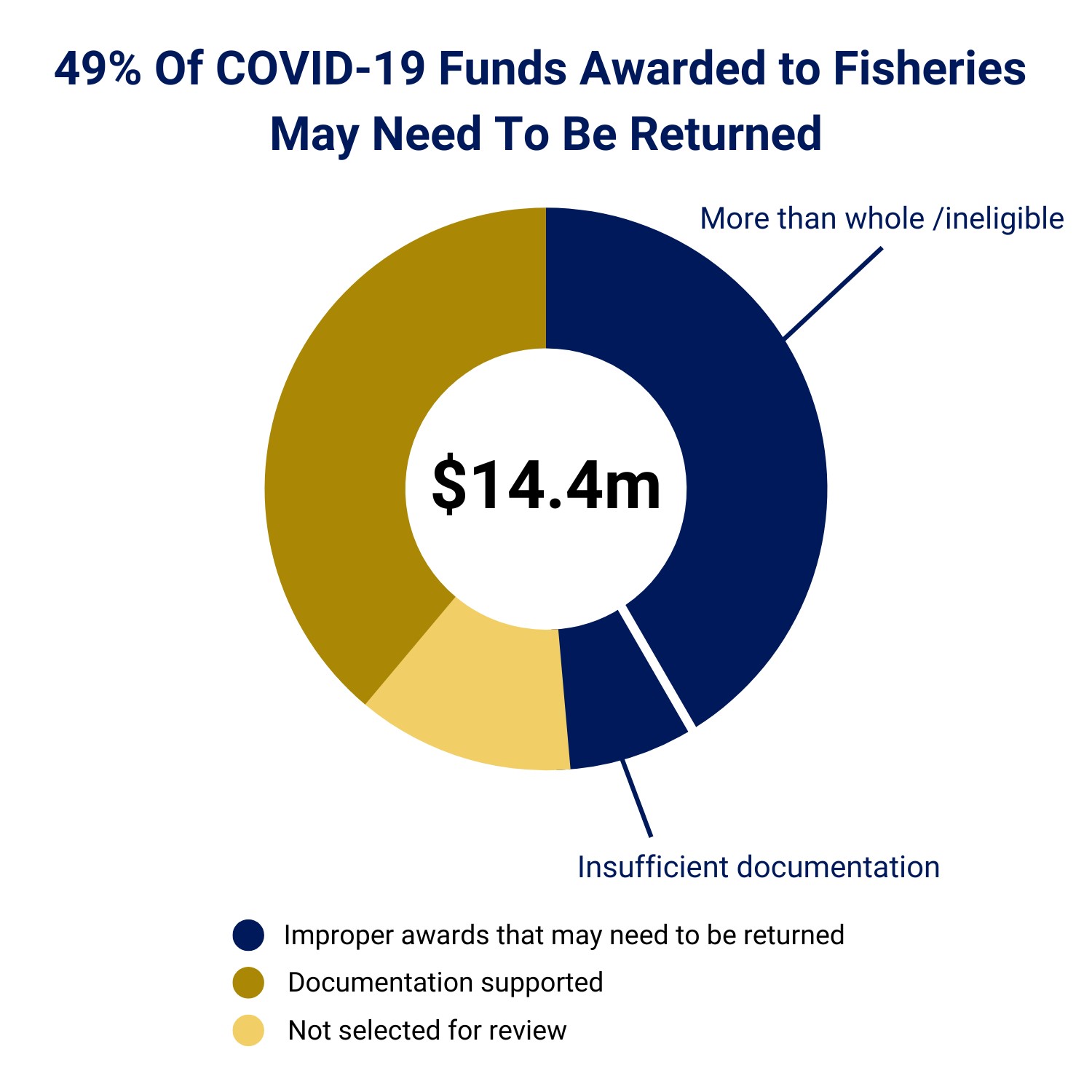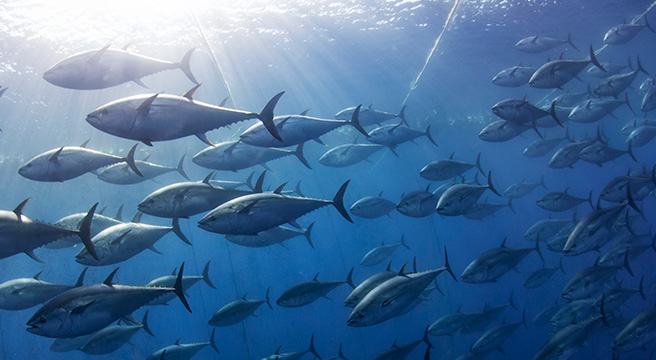
Follow-Up Review of COVID-19 CARES Act Marine Fisheries Assistance Grant Program
- Posted on - 06/20/2023
BY ELECTRONIC MAIL
Sean Moriarty, Deputy Commissioner
Department of Environmental Protection
428 East State Street
Trenton, New Jersey 08625
Sean.Moriarty@dep.nj.gov
Re: Follow-Up Review of COVID-19 CARES Act Marine Fisheries Assistance Grant Program
Dear Deputy Commissioner Moriarty:
Pursuant to Executive Order 166 (Murphy), N.J.S.A. 52:15C-1 to -24, and N.J.S.A. 52:15B-1 to -16, the Office of the State Comptroller (OSC) is authorized to review expenditures of COVID-19 recovery funds and related programs for fraud, waste, and abuse. OSC is also tasked with overseeing the work of independent COVID-19 Integrity Oversight Monitors (Integrity Monitors). Integrity Monitors serve as an important part of the State’s COVID-19 accountability infrastructure by working with departments and authorities to develop measures to prevent, detect, and remediate fraud, waste, abuse, or noncompliance in the expenditure of COVID-19 recovery funds. As part of OSC’s oversight responsibilities, OSC regularly reviews and follows up on reports produced by Integrity Monitors.
As you are aware, in March 2022, OSC issued a report in connection with its initial, limited review of the Department of Environmental Protection’s (DEP) administration of the New Jersey COVID-19 CARES Act Marine Fisheries Assistance Grant Program (Fisheries Program or program).[1] DEP also contracted with an independent Integrity Monitor to review its administration of the Fisheries Program. That contract ended in September 2022. The Integrity Monitor’s scope of work included a review of DEP’s financial, application, and administrative processes for all components of the program. DEP awarded a total of $14.4 million to fisheries through the program – $11 million in Round 1 and $3.4 million in Round 2. This letter memorializes the results of OSC’s and the Integrity Monitor’s reviews of the Fisheries Program and reports on DEP’s recent commitment to recoup public funds that should be returned to the State.
As part of its review, the Integrity Monitor conducted a risk-based sampling of program applications and reviewed 28 of 117 applications from Rounds 1 and 2 of the program.[2] The Integrity Monitor also requested that DEP obtain supporting financial documentation from the selected program applicants. The Integrity Monitor tested the sample program applications for a number of potential issues, which included incomplete financial records, applicants that were ineligible, and applicants that were made “more than whole.” At the end of its review, the Integrity Monitor explained its findings in a report.
OSC’s March 2022 report and the Integrity Monitor’s September 2022 report reached substantially similar conclusions. The Integrity Monitor’s report found that: 32 percent of sampled applicants had incomplete financial records; 7 percent did not incur a greater than 35 percent loss in revenue based on the supporting financial documents provided; 25 percent did not provide the necessary documentation to determine the loss in revenue; and 39 percent of sampled recipients were made “more than whole.”[3] DEP did not dispute these findings.
Collectively, OSC and the Integrity Monitor reviewed 52 out of 117 total applications to the Fisheries Program, which accounted for $12.6 million of the $14.4 million awarded (88 percent) by DEP.[4] As detailed in the attached exhibit, the combined findings from OSC and the Integrity Monitor reveal that at least 41 percent of program payments disbursed to applicants, or a total of $5.9 million, are subject to possible recoupment due to applicants that were made “more than whole” or ineligible for relief payments under the program guidelines.[5]
Additionally, 34 percent of applicants reviewed failed to provide complete documentation to support their awards when requested, subjecting an additional $1.1 million in relief payments to potential recoupment based on DEP’s program guidance ($932,052 from the Integrity Monitor’s sample and $247,000 from the fisheries reviewed by OSC).[6] According to that guidance, an applicant that cannot produce the required documentation when requested may subject the entire amount of its award to recoupment.[7] Therefore, in total, approximately $7 million in relief payments made under the program, or approximately 49 percent of all payments to applicants, may be subject to recoupment. See Exhibit A attached for more detail on the additional funding potentially subject to recoupment.

The more than $7 million in relief payments that are potentially subject to recoupment represents 49 percent of the payments awarded to applicants under the Fisheries Program. Nearly one-half of all applications were sampled across both reviews, but those applications accounted for 88 percent of all payments made to applicants under the program.
An agency’s responsibility to ensure that taxpayer dollars are used effectively and efficiently does not end when the payments are distributed. Agencies administering COVID-19 relief programs have an obligation not only to have sufficient controls in place to prevent fraud and improper payments, but also to respond quickly when potentially improper payments are later detected. Federal guidance requires that agencies establish and maintain effective internal controls into the post-award period including by taking prompt action when instances of noncompliance are identified.
OSC followed up with DEP regarding what steps it has taken to address the findings in OSC’s and the Integrity Monitor’s reports. DEP was provided with an opportunity to respond to the combined findings and recommendations made in this letter. DEP advised OSC that while it continues to seek advice and counsel, it has taken several steps to address the combined findings, ensure that program payments were proper, and recoup payments where appropriate. DEP recently reported that it has engaged with federal agencies regarding the findings in the Integrity Monitor’s and OSC’s reports and received input from those federal partners on its post-award and recoupment activities. DEP stated that it has begun to follow up with recipients to advise them on recipients’ continuing obligations to determine whether they have been made more than whole and explain to recipients the process to remit any applicable overpayments. DEP stated it has begun to review the $7 million in awards identified as inappropriate by OSC and the Integrity Monitor and seek recoupment of funds where appropriate pursuant to its program guidance. DEP also advised that it has instituted additional controls for the distribution of federal funds in other COVID-19 programs that it administers to reduce the opportunity for fraud, waste, or abuse, such as enhancing staff education on grants management systems and avoiding self-certifications when possible.
DEP has committed to providing OSC with periodic status reports, and OSC will continue to monitor DEP’s efforts.
Finally, for this program and other COVID-19 recovery programs, OSC highlights the importance of robust internal controls to protect public funds and ensure that COVID-19 programs are being administered in accordance with applicable requirements and in a manner that reduces the risk of fraud, waste, and abuse. Receiving and processing applications and distributing funds in a timely manner were critical to the success of the Fisheries Program, but the work is not done when the funds are distributed.
Very truly yours,
KEVIN D. WALSH
ACTING STATE COMPTROLLER
By: Caroline Jones, Director
COVID-19 Compliance and Oversight Project
Enclosure: Exhibit A – Potential Additional Recoupment
[1] See New Jersey Office of the State Comptroller, Review of COVID-19 CARES Act Marine Fisheries Assistance Grant Program, (Mar. 24, 2022), https://www.nj.gov/comptroller/news/docs/dep_report.pdf.
[2] The Integrity Monitor’s report noted that it reviewed OSC’s March 24, 2022 report to gain an understanding of the methodology selected and the findings disclosed. It used that report to identify further risk areas and ensure that the Integrity Monitor’s sample selection differed from the OSC’s. OSC’s review was limited to Round 1 of the program. See Vander Weele Group, Integrity Monitor Report, (Sep. 30, 2022), https://gdro.nj.gov/tpbackend/documents/NJ%20DEP-VWG%20Integrity%20Monitor%20Report%20-%20Q3%202022%20FINAL%20v2.pdf.
[3] The Integrity Monitor identified several recipients that had multiple findings such as being made more than whole as well as failing to provide documentation to support their eligibility.
[4] OSC did not duplicate the Integrity Monitor’s review, but relied upon it findings and the data it collected. DEP had the opportunity to challenge those findings prior to the public release of the Integrity Monitor’s report, but did not dispute the findings or the accuracy of the data.
[5] The Integrity Monitor identified two recipients that were ineligible to receive program funds for failing to meet the necessary 35 percent revenue loss and were also made “more than whole.” OSC included those recipients in the "not eligible" category and excluded them from the "more than whole" category to avoid duplication in OSC's total. See Exhibit A.
[6] If a fishery was already subject to recoupment based on “more than whole” or eligibility findings, OSC reduced the potential recoupment for failure to produce documentation by that amount.
[7] Although applicants were not required to submit any documents to support their stated revenue or loss at the time they applied, applicants had to self-certify that the information in the application was accurate, that they had documentation or records that supported their eligibility, and that those records would “be made available upon request.” DEP’s program guidance made clear that applications lacking documented proof are subject to recoupment. By signing a certification, applicants agreed to be “subject to additional review and audit” to confirm the accuracy of the applicant’s eligibility. Additionally, DEP’s Spending Plan, which was approved by the federal government, specified that “if an applicant refuses to provide documented proof or is found to have knowingly acted in bad-faith and provided falsified or inaccurate information . . . [the applicant] will be required to pay back in full all funding that was received and may be subject to additional penalties.”

Press Contact
Pamela Kruger
Pamela.Kruger@osc.nj.gov
609-789-5094
Waste or Abuse
Report Fraud
Waste or Abuse
 Official Site of The State of New Jersey
Official Site of The State of New Jersey